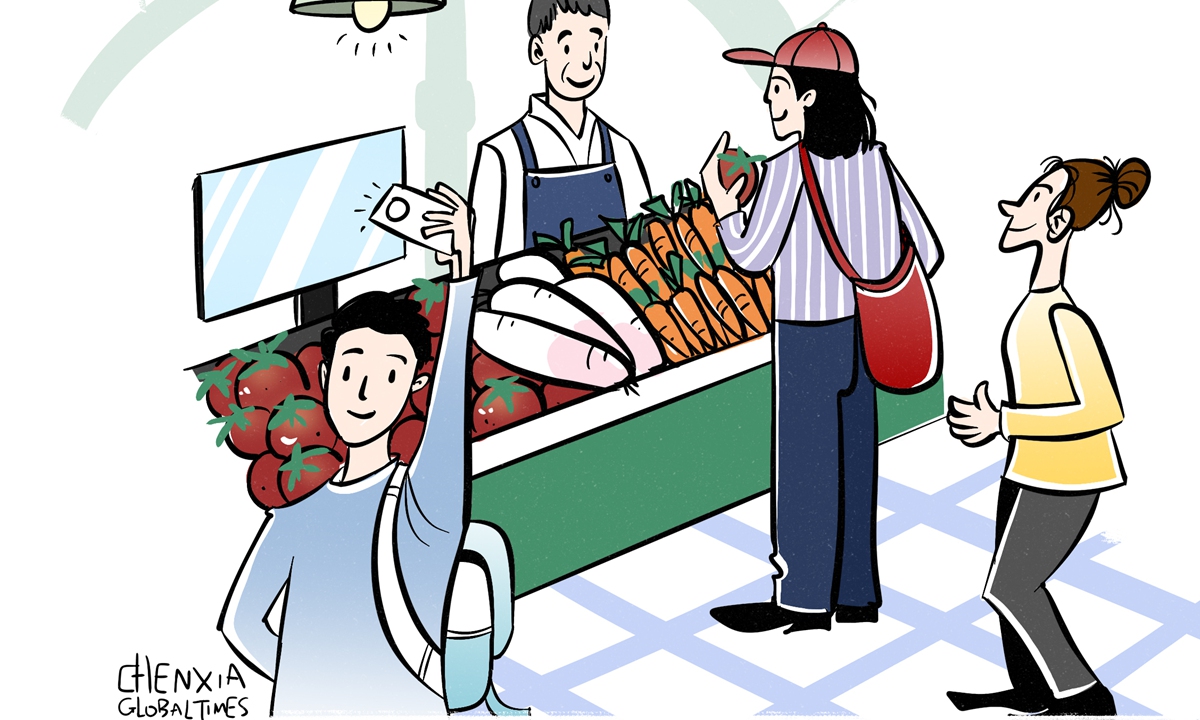ARTS / CULTURE & LEISURE
How Chinese farmers markets become chic

Illustration: Chen Xia/GT
Numerous posts about farmers markets across China have been going viral on various social media platforms recently, with recurring keywords including "warm my heart" and "the flavor of local life." Looking at these comments, it is easy to see that these traditional markets are enjoying a rise in popularity among the younger generations in China.Chinese writer Wang Zengqi once wrote, "When I arrive in a new place... I prefer to visit the local farmers market to see live chickens and ducks, fresh and vibrant produce, and bright red chili peppers. It's lively and bustling, creating a delightful sense of the joy of life."
It seems that more and more young people feel the same as Wang. They love to explore farmers markets wherever they visit. Data on social media platforms directly reflect this trend. On Xiaohongshu, a popular Chinese lifestyle platform, the hashtag "Farmers market travel guide" has amassed more than 1 billion views. Meanwhile, the Sina Weibo topic "Visiting a city without exploring its farmers markets is a waste of a trip" has garnered almost 9 million views.
Drawing in large crowds, what were once just daily shopping spots for locals have turned into popular tourist attractions during holidays. Young people flock to these markets not only for the bustling atmosphere and the delicious food, but also for how they reflect the cultural depth and interpersonal nature of a city.
Daben, a vlogger based in Beijing who runs a channel on video sharing platform Bilibili, is also keen on delving into the unique charm of farmers markets in different places as "these markets are closer to the daily life of local people than those overdecorated scenic spots and supermarkets that seem all the same everywhere."
In Xi'an, Northwest China's Shaanxi Province, Daben tasted a variety of staple foods, such as stone-cooked bread, flatbreads and crescent-shaped buns at local farmers markets, which allowed him to deeply understand why the city is known for its carb-rich cuisine.
Traveling in Hohhot, North China's Inner Mongolia Autonomous Region, the vlogger made a point to find a farmers market, which featured freshly made roasted beef jerky and air-dried beef.
"It is reassuring to buy directly from the vendors who prepare the food on-site. They even shared tips on how to roast beef jerky for the best flavor, providing me with valuable insights and little tricks of the trade," Daben told the Global Times.
The vlogger noticed a group of foreign tourists wandering around a farmers market in Beijing. They meandered from stall to stall, engaging in conversation with the vendors despite language barriers and being drawn in by the array of diverse local snacks.
As China's visa-free policies have expanded, the country has witnessed a significant surge in international tourism, with foreign visitors flocking to various Chinese cities. Among the attractions now included on their itineraries are traditional farmers markets, which are gaining popularity as a unique and authentic experience for travelers.
Be it Shanghai or Nanjing, capital of East China's Jiangsu Province, foreigners who experienced shopping at traditional markets are touched by the energy of locals and the flavor of Chinese daily life.
"A farmers market embodies a quintessential aspect of Chinese lifestyle, and the diverse array of produce sold at these markets reflect the abundant resources available in modern Chinese life, leaving a lasting impression on foreign visitors," Sun Jiashan, an associate researcher at the Central Academy of Culture and Tourism Administration, said in an interview with the Global Times.
Sun highlighted that the popularity of farmers markets among young tourists signifies a notable shift in the tourism landscape. This change reflects a transition from a focus on grand scenery and whirlwind tours that attempt to cover every aspect to a more immersive travel experience characterized by a slower pace that allows visitors to engage more intimately with local life and enjoy deeper experiences.
The historical vibe of a farmers market makes it more appealing than typical tourist spots. Young people aren't just coming here to eat; they're using this place as a window to gain insight into a city's development and to feel the warmth of its community.
Farmers markets also serve as social spaces where people can meet, chat and share experiences. For younger travelers, visiting a market with friends can be a bonding activity, from exploring exotic fruits to learning about local recipes from vendors. These traditional markets offer a break from their fast-paced, screen-dominated lives, providing a space where they can slow down, connect with others, and engage with their surroundings.
As part of this trend, many old farmers markets that hold the memories of generations have been renovated and are set to reopen. One such market is the Chongwenmen farmers market in Beijing, originally established in 1976. After 15 years of closure, it will officially reopen to the public on Wednesday.
Daben is eager to experience both the original and newly renovated sections of the market. "I think it will be even more attractive than before," she said.
The author is a reporter with the Global Times. life@globaltimes.com.cn




